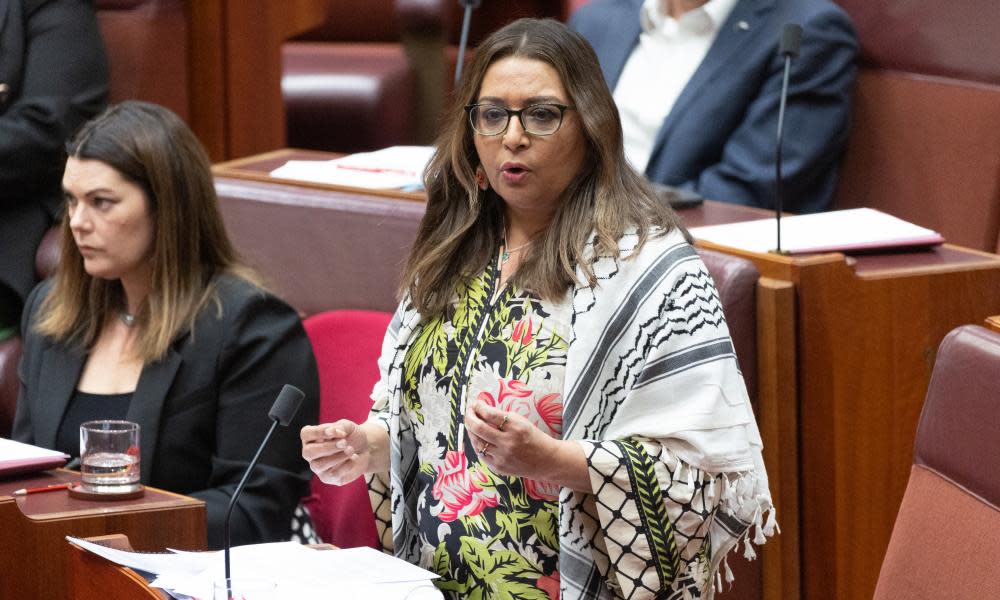Letter excerpts read in Senate accuse Australian Human Rights Commission of mistreating staff who support Palestine

Human rights lawyer Sara Saleh has alleged senior management at the Australian Human Rights Commission (AHRC) viewed her Palestinian identity as a risk, and leaked information about her resignation from the commission to a rightwing shock jock, the Senate has heard.
Saleh, who was employed as a legal researcher at the commisson, is one of at least seven staff in the last quarter to quit the AHRC alleging concern over the commission’s treatment of staff who express support for Palestinians, the Greens deputy leader Mehreen Faruqi told the Senate on Wednesday.
Faruqi read parts of four resignation letters under parliamentary privilege.
“Sara Saleh’s resignation letter spoke of how her identity was viewed as a risk by senior management, and how a rightwing hit piece on her was circulated,” Faruqi said.
Guardian Australia understands the “hit piece” article was critical of Saleh’s appointment at the AHRC given her public statements in support of Palestinians and critical of Israel. The article was circulated to commission staff as part of its the daily round up of mentions of the commission in the media.
Faruqi told the Senate that Saleh’s letter states that “deliberate circulation” of a “defamatory” news piece about her to all staff was “… egregious, detrimental to my reputation and hurtful. This also sent a message to staff of colour, that the commission is willing and capable of circulating vitriolic commentary about them in the future.”
In July, 2GB radio host Ray Hadley claimed in an “exclusive” that the commission had confirmed to him Saleh had resigned. In the letter quoted by Faruqi in the Senate, Saleh states this revelation was made against her wishes, and said it allowed “radio shock jocks, among others, to publicly humiliate me and attack my reputation”.
Another former staff member, Hiero Badge, claimed there was “internal suppression of pro-Palestinian perspectives and voices” at the commission, according to their resignation letter, also quoted by Faruqi under parliamentary privilege.
“In one instance, I was informally cautioned by a senior official for using the phrase ‘from the river to the sea’ on my personal social media. Similarly, I was informally reprimanded for summarising a UN press release on the situation of women and girls in Gaza,” Badge’s letter reads.
Another letter quoted by Faruqi alleges institutional racism and hostile working conditions at the commission.
Faruqi attempted to table the four letters in the Senate but was refused.
A spokesperson for the commission said the allegations were not put to the commission prior to Faruqi’s speech. They added that some of the claims were previously denied during Senate estimates in May.
“Staff welfare is of paramount concern for the commission. We are committed to continuously improving our workplace culture and to making our workplace safe, respectful and inclusive for all our staff,” the spokesperson said.
“We have a range of policies, procedures and wellbeing programs in place to help staff members feel supported, and to address any concerns they may have in relation to their employment.”
The commission said claims a staff member’s resignation was confirmed to a media outlet without consent were not accurate. The circulation of news reports to staff is standard practices across commonwealth agencies, it said, with daily media summaries of reports mentioning the commission circulated to staff.
The commission has previously denied issues with treatment of staff.
Guardian Australia first reported in February that at least 24 staff across eight teams at the commission wrote anonymously to the then president, Rosalind Croucher. They expressed “frustration at the commission’s failure to fulfil its mandate as an accredited national human rights institution in regard to Israeli war crimes and crimes against humanity perpetrated against Palestinians in Gaza and the West Bank”.
Croucher told Faruqi in Senate estimates in May she was unaware of staff being spoken to, but that employees had been reminded of the Australian Public Service code of conduct.
“It was clear that we reminded staff on at least two occasions – as the union reminded staff – about the code of conduct expectations,” she said. “The role of commissioners as independent statutory office holders is a different consideration. The role of our staff is within the public service.
Related: Julian Leeser accuses Australian Human Rights Commission of failing to address antisemitism
“Reminding people of their obligations is an appropriate, responsible and accountable thing for senior leadership within the commission to do.”
Faruqi said the commission’s new president, Hugh de Kretser, had an opportunity to reset the culture of the organisation.
”I’d encourage Mr Kretser to read these resignation letters carefully and chart a new course for the commission, one which ensures a safe workplace including for people of colour, LGBTQIA+ people and one which involves taking a loud, fearless and staunch stance on the greatest moral injustice of our time – Israel’s genocide of the Palestinian people in Gaza.”
Israel denies committing genocide in its military response to the 7 October attacks by Hamas.


